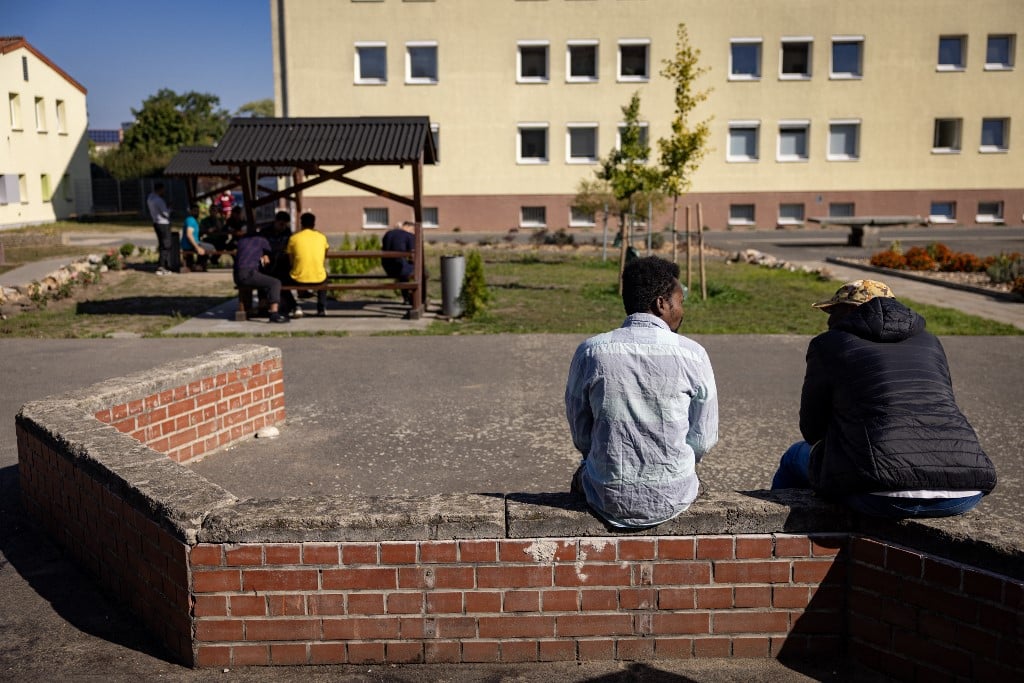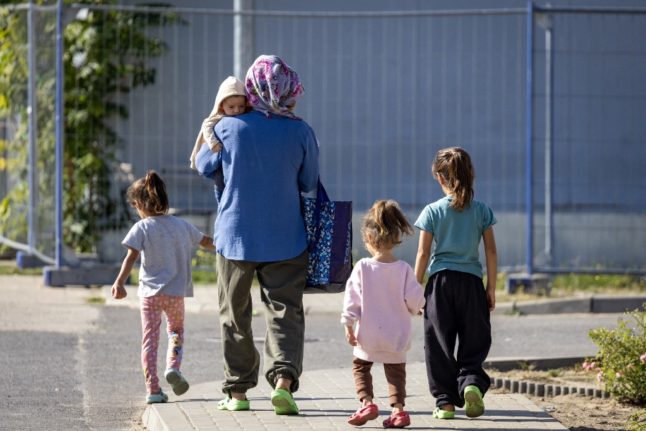The former barracks turned 1,500-bed facility in Eisenhüttenstadt risks running out of space soon as migrants are turning up in Germany in numbers not seen since 2015, when then chancellor Angela Merkel opened the doors to hundreds of thousands of refugees from Syria and beyond.
The new influx has pushed Olaf Scholz’s government to take steps to limit entries into Germany, reignited a bitter debate over immigration and given a push to the far right in the polls.
READ ALSO: Why are some Germans turning towards the far right?
The Eisenhüttenstadt facility was already hosting 1,400 this week, and while every day, migrants who have received offers of more permanent housing move on, fewer are leaving now as cities and towns report shrinking capacity to take them in.
“Every day around 100 people arrive here. And that could go up to 120,” Jansen, 63, told AFP.
“If you add together the asylum seekers and those coming from Ukraine – who do not have to file (an asylum) application in Germany – it is like 2015,” he said.
Two routes
There had been an “explosion” in the “number of illegal crossings on the German-Polish border”, regional interior minister Michael Stuebgen said earlier this week.
“It has never been this high,” Stuebgen said of the number of arrivals in his region, Brandenburg.

On Friday, Interior Minister Nancy Faeser said Germany, Poland and the Czech Republic will join hands to boost border controls to crack down on people smugglers.
To arrive at the Polish border and cross in to Germany, there are two main routes for migrants.
“Half of the migrants in Eisenhüttenstadt have come via Moscow and Belarus, and the other half took the route through the Balkans, which also goes through Hungary and Slovakia,” said Jansen.
Abdel Hamid Azraq, 34, from Aleppo in Syria is one of the recent arrivals.
“From Turkey to Greece it was $500 (471 euros). From Greece to Serbia, $1,000 and the same again to get to Germany,” he told AFP.
Azraq’s journey came relatively cheap, according to Jansen. “The sums asked for by smugglers are between $3,000 and $15,000, depending on the degree of comfort,” he estimated.
Syrians like Azraq make up the largest group at the Eisenhuettenstadt centre – between 15 and 20 percent. Other new arrivals include Afghans, Kurds from Turkey, Georgians, Russians, Pakistanis, Cameroonians and Kenyans.
In Jansen’s opinion, the move to beef up police checks at the borders is a positive step.
Staying put
“With every new control, more smugglers are stopped. One smuggler fewer means dozens of people who they cannot smuggle over,” Jansen said.
According to Jansen, Belarus has continued to send migrants from the Middle East into Poland, from where they travel on to Germany, a strategy already put into use by Minsk in 2021.
“It is 12 months now that we have a lot of arrivals coming from that country,” Jansen said of Belarus, recounting that migrants report being given “ladders and big scissors to make holes in the fences” put up by Poland to keep them out.
Around 80 percent of the migrants who arrive in Eisenhüttenstadt are escorted by police who stopped them close to the border. The other 20 percent make their own way there.
At the centre, where migrants normally stay three or four months before being sent on, new arrivals are able to make their first asylum request.
Around half of the migrants in Eisenhüttenstadt have a chance of having their requests granted, Jansen said.
The chances of staying look good for 24-year-old Iraqi Ali Ogaili, who told AFP he was a homosexual. In Eisenhüttenstadt , women and LGBT people have their own building to keep them safe.
Staying in Germany is the hope of many at the camp. Azraq told AFP he wants to “work, bring my family here, settle down and serve this country and German society”.
By Céline LE PRIOUX





 Please whitelist us to continue reading.
Please whitelist us to continue reading.
Member comments